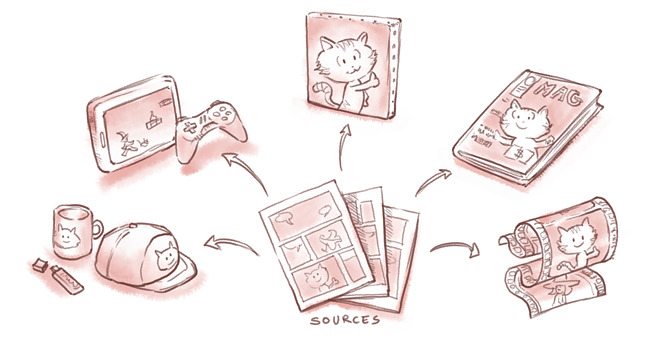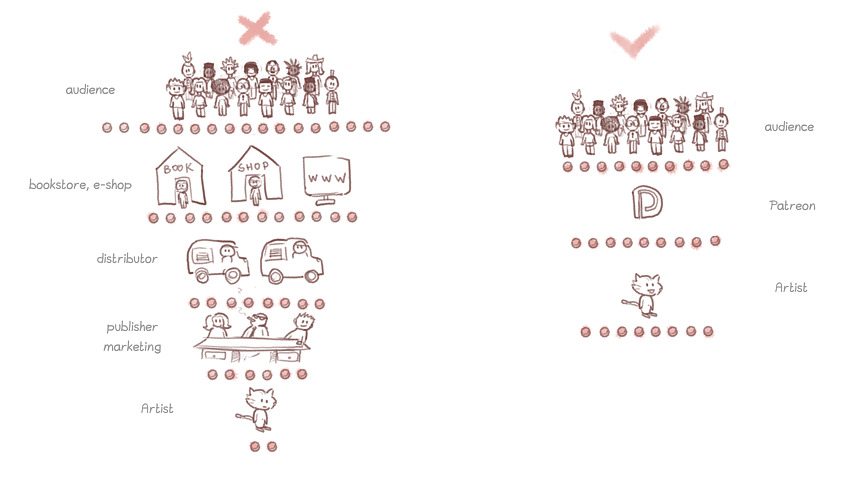
Open source has become the programmers’ daily bread: Hardly a project that does not build upon publicly available code from open source projects, licensed such that use of the code (as is or modified) is permissible even for commercial endeavors. An increasingly popular web comic about a young witch called Pepper and her tomcat Carrot is developed as “open-source comic.” Open source in the arts?!?
Pepper&Carrot is created by David Revoy, a freelance artist, who for many years has been a strong proponent of the open-source movement (with respect to program code, that is), using exclusively open tools such as the Linux operating system and the excellent Krita painting program. Krita advertises itself as “made by artists that want to see affordable art tools for everyone,” and David is one of them.
When David started with Pepper&Carrot, he decided to publish the comic under one of the most liberal open licenses there is, the creative commons CC BY license. CC BY allows you to use the artwork for anything (also commercial usage) as long as the original artist is properly credited and modifications to the work are indicated. That is pretty much as open as you can get, short of dedicating your work into the public domain. You want to make a computer game based on Pepper&Carrot, a role playing game, or a board game, and maybe even sell it? Be sure to credit David Revoy properly for his creation, and you are good to go. Of course, most of us probably do not want to start a commercial venture… but for which other comic can you have T-shirts printed for your kids (your kids will love Pepper&Carrot) without infringing somebody’s copyright?
On his page about the philosophy behind his approach, David illustrates the idea like this:

David makes building upon his work truly easy through the open-source aspect of his work. He publishes the high-resolution graphic files for the comics as well as tools and templates with which the comics have been produced: the artist’s digital brush collection for Krita, template files for comic pages and speech bubbles, etc. Thus, building upon David’s work becomes a lot easier. Take the picture at the beginning of this article as an example. I modified it for GeekDad with a coloring (or, rather, de-coloring) effect on the right-hand side of the picture. This was a matter of seconds, because David uses Krita‘s layering feature to separate line art and coloring. So all I had to do was to access the Krita source file of the comic page, erase a bit of the coloring layer, and paste in the image of a brush (the latter taken from Pixabay, a great resource for graphics in the public domain).
So, how does David make a living? Well, Pepper&Carrot is financed via Patreon. David is following a very clearly defined philosophy of comic publishing, as illustrated by another image from David’s philosophy page:

This summer, David achieved what every comic author surely aspires to: Glénat, a well known publisher, announced that they would publish a Pepper&Carrot comic book. In a blog post, David excitedly told his readers and patrons about the upcoming comic book to be produced by Glénat. In the post, he revealed that he does not benefit financially from the comic book, but that Glénat had voluntarily become a patron in a newly created $350 Patreon category for publishers, pledging this amount for each future episode of the comic. David also pointed out that Glénat would publish the book for 10€ rather than the price of 14,50€ or so for comparable comic books.
This started a bit of a controversy on several French blogs concerned with comics. Had David been right in his choice of putting Pepper&Carrot under the creative commons attribution license? Was his new model of comic publishing a success, or had he opened himself up to exploitation by comic publishers, giving them something for nothing? The financial side of the Glénat deal was compared with advances and payments in “traditional” arrangements. Some declared the new model to be very unfavorable for the artist, while others stated that a monthly patronage by a comic publisher in an environment of diminishing advances and payments might actually be preferable for an artist.
I do not want to reopen this controversy, not least because the artist himself is clearly tired of it by now. Suffice to say that at least for David Revoy, his choice seems to be working out well. For example: a few weeks ago, the German publisher POPCOM joined Glénat as $350-per-episode patron and will publish a German version of Pepper&Carrot; recently, a crowd-funding campaign to produce an animated version of some Pepper&Carrot comics was successfully funded, so David Revoy will see his comics come to life; there is a growing community of Pepper&Carrot enthusiasts that contribute with translations, add to the Wiki about Hereva, the world in which Pepper&Carrot takes place, and create fan art.
Would David have had comparable success with a “closed source,” copyrighted approach? His artwork is great, so I think he would have been successful without the extra momentum derived from the excitement by many of his readers that they really could take Pepper&Carrot and make them their own in their own works. Might David have been spared some trouble with persons essentially abusing the license (there had been one successful and one aborted Kickstarter for printing the comics under rather dodgy circumstances)? Yes, he probably would have. But David Revoy is a true open-source enthusiast, who has managed to make the open-source model work both for his own good and for the good of us comic readers, especially those with a creative streak and ideas to build upon his work. I applaud him for his courage and his firm commitment to the open-source philosophy, and wish him much success in the future with Pepper&Carrot.
If you have not yet done so, be sure to have a look at Pepper&Carrot, and be sure to show it to your kids (according to David’s blog, the recent Norwegian translation of almost 20 episodes of the comic was done in record time by a Norwegian under serious pressure from his daughter, who wanted to read all episodes for herself as quickly as possible).
With December around the corner, here is a panel from the 2014 winter holiday episode of Pepper&Carrot:

If you want to learn more about how David is using Krita to draw his comics, be sure to check out his almost two-hour long video tutorial.




Hey Bernd! I found this through Wikipedia references on the P&C article (looks like a couple of language versions link here); good review!
Since David Revoy updated the orthography of the name of the comic to Pepper&Carrot (without spaces) I was wondering if you would revise to match? Thanks either way!
Hi Arlo,
thanks for your kind words, I’m glad that you enjoyed the article … and I didn’t know that some language versions of the Pepper&Carrot article on Wikipedia are referencing it, that’s kinda cool! Thanks also for making me aware of the name change of “Pepper&Carrot” — I have updated the article accordingly!
Kind regards,
Bernd